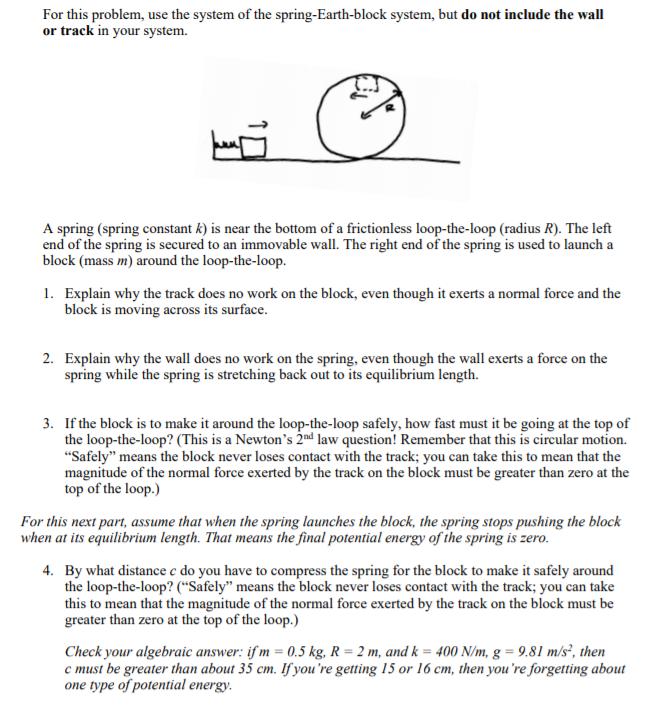Answered step by step
Verified Expert Solution
Question
1 Approved Answer
For this problem, use the system of the spring-Earth-block system, but do not include the wall or track in your system. A spring (spring

For this problem, use the system of the spring-Earth-block system, but do not include the wall or track in your system. A spring (spring constant k) is near the bottom of a frictionless loop-the-loop (radius R). The left end of the spring is secured to an immovable wall. The right end of the spring is used to launch a block (mass m) around the loop-the-loop. 1. Explain why the track does no work on the block, even though it exerts a normal force and the block is moving across its surface. 2. Explain why the wall does no work on the spring, even though the wall exerts a force on the spring while the spring is stretching back out to its equilibrium length. 3. If the block is to make it around the loop-the-loop safely, how fast must it be going at the top of the loop-the-loop? (This is a Newton's 2nd law question! Remember that this is circular motion. "Safely" means the block never loses contact with the track; you can take this to mean that the magnitude of the normal force exerted by the track on the block must be greater than zero at the top of the loop.) For this next part, assume that when the spring launches the block, the spring stops pushing the block when at its equilibrium length. That means the final potential energy of the spring is zero. 4. By what distance e do you have to compress the spring for the block to make it safely around the loop-the-loop? ("Safely" means the block never loses contact with the track; you can take this to mean that the magnitude of the normal force exerted by the track on the block must be greater than zero at the top of the loop.) Check your algebraic answer: if m = 0.5 kg, R = 2 m, and k = 400 N/m, g = 9.81 m/s, then c must be greater than about 35 cm. If you're getting 15 or 16 cm, then you're forgetting about one type of potential energy. %3D !!
Step by Step Solution
★★★★★
3.43 Rating (156 Votes )
There are 3 Steps involved in it
Step: 1

Get Instant Access to Expert-Tailored Solutions
See step-by-step solutions with expert insights and AI powered tools for academic success
Step: 2

Step: 3

Document Format ( 2 attachments)
635d79bbb0819_175973.pdf
180 KBs PDF File
635d79bbb0819_175973.docx
120 KBs Word File
Ace Your Homework with AI
Get the answers you need in no time with our AI-driven, step-by-step assistance
Get Started


